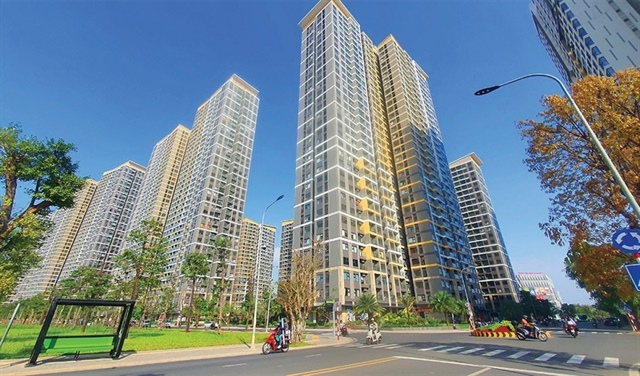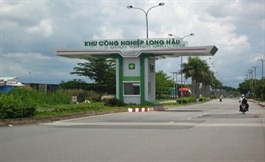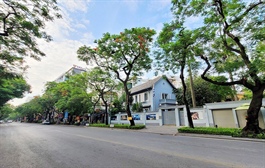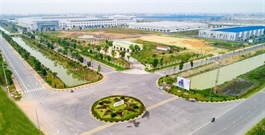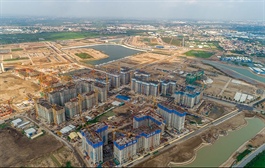Banks may brace for impact of property market strain
Banks may brace for impact of property market strain
Việt Nam's property market has been experiencing a downturn for nearly a year, leading to concerns about its impact on banks and the overall economy.

Home buyers learn information about the Swanbay project in Đồng Nai Province. — VNA/VNS Photo |
A recent survey conducted by S&P Global Ratings has shed light on a worrisome aspect of the Vietnamese property landscape – the heavy reliance of local developers on short-term funding. This overdependence on short-term funding renders them highly vulnerable to liquidity and default risks whenever access to funding becomes restricted.
By the end of December 2022, the short-term debt of Vietnamese developers had soared beyond their cash balance, surpassing a critical threshold of 100 per cent.
"We believe the strains will be manageable for the banks," said S&P Global Ratings analyst Ivan Tan.
Banks are more likely to suffer nonpayment from commercial real estate loans, which make up 7 per cent of loan books for Vietnamese banks. In a worst-case scenario, sector-wide nonperforming loans (NPLs) would rise to about 4.5 per cent, by our rough estimates, Tan said.
The property market's current woes can be traced back to a period of rapid growth prior to 2022, driven by rising affluence and economic development. As demand surged, real estate firms sought large amounts of capital, facing challenges in accessing bank credit. They turned to the bond market and raised funds through private placements, leading to a significant expansion in Việt Nam's corporate bond market.
In a short span, the Việt Nam corporate bond market witnessed a meteoric rise, growing to around 15 per cent of GDP by 2022 from a mere 5 per cent in 2017. However, the exponential growth of small- and mid-sized property developers that mobilised substantial capital at high interest rates raised red flags for regulators.
To address the situation, a series of reforms were implemented in September 2022, which included the introduction of "Decree 65", imposing more stringent conditions on private bond placements. This coincided with interest rate hikes, creating refinancing stress for property developers and causing the bond market to contract for the first time in nine years. Several real estate projects were delayed or put on hold, and consumer sentiment turned negative as sales dried up and prices corrected.
The banking system's exposure to the property sector is significant, with property-related loans accounting for about 25 per cent of total loans. Mortgage loans make up the majority at approximately 15 per cent, followed by commercial real estate loans at 7 per cent, and corporate bond holdings at 3 per cent.
According to data compiled by KB Vietnam Securities JSC, between the beginning of the year and June 14, late payment of principal and interest on corporate bonds amounted to an estimated VNĐ61 trillion (US$2.6 billion), accounting for 5.7 per cent of the outstanding corporate bonds' value. Real estate dominated the industry structure, representing 71 per cent of the total value of corporate bonds with late repayments, reaching VNĐ42.4 trillion.
Looking ahead, the second half of 2023 is expected to witness around VNĐ150.6 trillion worth of corporate bonds maturing, of which the real estate sector is responsible for VNĐ63.3 trillion, accounting for 42 per cent of the total maturity value.
Data on the Hà Nội Stock Exchange showed around 13 non-banking enterprises, with 12 operating in real estate, will possess bonds valued at over VNĐ3 trillion each to be matured in the second half of 2023, indicating an increased risk during this period.
Despite the challenges, there are positive factors that could contribute to the market's recovery.
"Property dynamics in emerging markets like Việt Nam are inherently volatile," said Tan. "However, we believe the fundamentals favour a recovery. This will be underpinned by supply and demand fundamentals reflecting the country's favourable demographics, a young workforce and a growing middle class."
The Vietnamese authorities have taken measures to protect financial stability. The central bank has cut interest rates multiple times and suspended certain requirements under Decree 65 to ease repayment burdens for developers. The Government has also delayed loan repayments or restructured bad debts for distressed property companies.
Industry insiders have expected the property market will gradually recover by the end of 2023 and the beginning of 2024, driven by Government policies aimed at promoting economic activities and attracting foreign investment.






